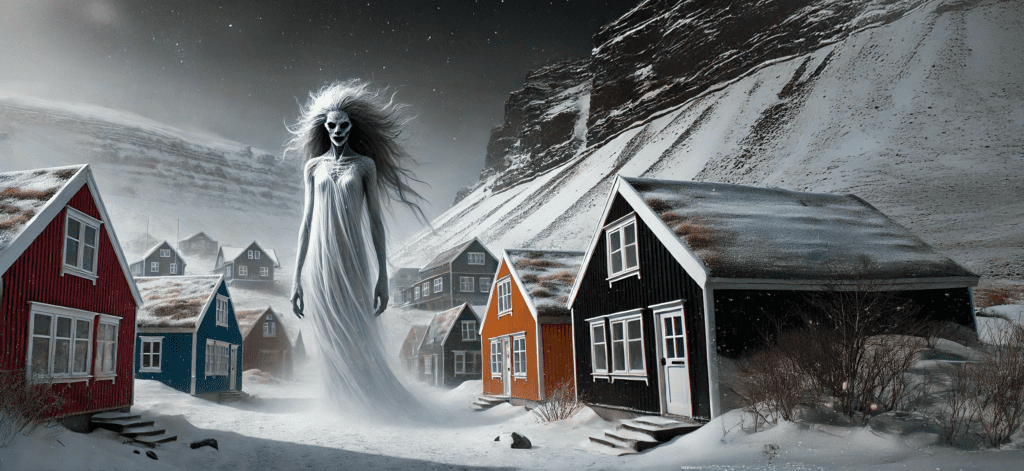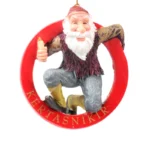Lussi Langnatt – The Spirit of the Longest Night

“Lussi glides through the winter skies, her icy breath warning those who defy the Yule season’s traditions.”
Introduction
Lussi Langnatt, the spirit of the longest night, is a spectral figure among the forgotten Yule Lads. Unlike her more physical counterparts, Lussi’s presence is ethereal, embodying the dark, cold stillness of the Icelandic winter. Her arrival is marked by the Winter Solstice, the longest night of the year on December 21st. On this night, she drifts from home to home, looking for those who have neglected the traditions of the Yule season, particularly those who haven’t finished their winter preparations.
Historical Background and Earliest Known Reference
Lussi’s character likely originated in the pre-Christian traditions of Iceland, where spirits associated with the changing seasons played an important role in folklore. Her name is most prominently linked with the tradition of “Lussinatta,” or “Lussi’s Night,” which was celebrated in several Nordic countries on the longest night of the year. During this time, people believed that evil spirits roamed the land, and it was critical to have the house in order to avoid their wrath. Lussi’s character embodies these fears and superstitions, reinforcing the importance of preparedness during the darkest part of the year.
The earliest references to Lussi Langnatt come from Icelandic oral traditions, but she was later featured in more modern collections of folklore, including the works of Jóhannes úr Kötlum, who helped preserve her legend. Though less well-known today, Lussi remains a symbol of winter’s darkest night and the dangers it can bring.
Physical Appearance and Clothing
Lussi Langnatt is often depicted as a shadowy figure, with little known about her physical appearance beyond her cold, spectral form. She is said to glide through the air, her long robes blending into the night, giving her an almost formless shape. Her face is rarely seen, as she is more of a presence than a physical being, but some stories describe her breath as icy and her eyes as cold as the winter moon. Unlike other Yule Lads, who wear tattered Icelandic clothing, Lussi’s form is more ghost-like, her dark silhouette blending with the shadows of the night.
Likes, Dislikes, and Habits
Lussi Langnatt’s sole concern is the preparedness of households for the long winter ahead. She dislikes laziness and disobedience, particularly when it comes to chores like cleaning the house, storing food, and tending to livestock. Those who have not completed their winter tasks by the time of her visit risk her displeasure, which can result in misfortune or even bad luck for the household.
While Lussi is not malicious by nature, her visits are unsettling. She drifts through homes, checking that everything is in order. If a household has failed to prepare for the winter, Lussi may freeze doors shut, snuff out fires, or even leave an icy chill that lingers for days. She is particularly watchful of homes where children misbehave or parents neglect their responsibilities.
Types of Pranks and Mischief
Lussi’s pranks are not playful like those of her brothers but are instead eerie and meant to instill fear. One of her most well-known tricks is freezing doors shut, trapping families inside their homes, or extinguishing fires, leaving a house cold and dark. In some tales, she causes bad dreams or sends a chill through the house, affecting anyone who hasn’t followed the proper traditions. These actions serve as a reminder of the power of the winter season and the importance of preparedness.
Lussi’s presence is also linked to mysterious disturbances. Families may wake up to find doors locked from the inside, fires that should have burned through the night suddenly out, or an unexplained draft sweeping through the home. These signs are said to be evidence of her visit, a chilling warning to those who haven’t respected the traditions of Yule.
Relationship with Humans and Other Yule Lads
Lussi Langnatt’s relationship with humans is one of caution. She does not cause direct harm, but her visits bring an air of fear and urgency. Households that fail to meet her expectations risk falling prey to her silent wrath. While some of the Yule Lads engage in harmless mischief, Lussi’s role is more serious, as she serves as a reminder of the consequences of neglecting one’s duties.
Among her brothers, Lussi is often seen as a figure to be respected, if not feared. While many of the Yule Lads focus on stealing food or causing minor annoyances, Lussi’s mission is more focused on maintaining order and tradition. She is considered the spirit who ensures that the Yule season runs smoothly, making sure that everything is prepared for the long, dark winter.
Modern Depictions and Popularity
Today, Lussi Langnatt is a lesser-known figure in Icelandic Christmas folklore, overshadowed by her more mischievous brothers. However, her role as the spirit of the longest night continues to be remembered in more traditional settings. In some rural parts of Iceland, stories of Lussi’s visits are still told, often as a way to encourage children to behave or to remind families of the importance of winter preparations.
In modern depictions, Lussi has taken on a more ghostly role, with artists and storytellers emphasizing her ethereal nature and her connection to the Winter Solstice. Though not as commonly featured in Christmas celebrations today, Lussi’s legacy endures as a symbol of winter’s darkest night and the importance of readiness for the cold months ahead.
Fun Facts and Trivia
- Lussi’s name is connected to the tradition of “Lussinatta,” or “Lussi’s Night,” celebrated in Scandinavia on the Winter Solstice.
- Her pranks often involve freezing doors shut or extinguishing fires, leaving households cold and vulnerable.
- Lussi is one of the few Yule Lads associated with bad luck and misfortune, rather than playful tricks.
Astrological Sign: Capricorn
Lussi’s connection to responsibility, discipline, and the Winter Solstice aligns her with the traits of Capricorn. Capricorns are known for their practicality, strong sense of duty, and connection to the winter season, much like Lussi’s role in ensuring that winter preparations are completed.
Cultural Significance
Lussi Langnatt’s legend serves as a reminder of the importance of discipline, responsibility, and preparation in the face of winter’s hardships. Her presence reflects the need to respect tradition and ensure that everything is in order before the darkest night of the year arrives.
Voices of Tradition
“Lengsta nótt vetrarins tilheyrir Lussi, og andardráttur hennar ber frost til þeirra sem eru óundirbúnir.“




